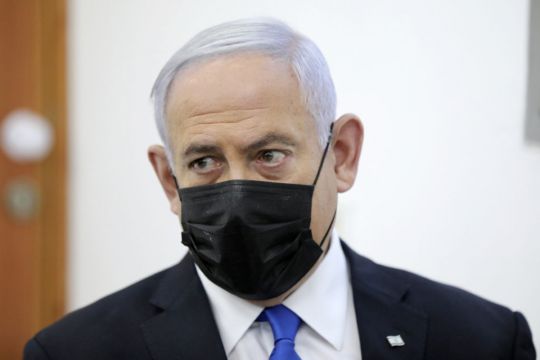Prime Minister Benjamin Netanyahu’s corruption trial has resumed, with a key witness painting a picture of an image-obsessed Israeli leader forcing a prominent news site to flatter his family and smear his opponents.
The testimony came as Mr Netanyahu’s chances of securing another term in office following last month’s parliamentary elections appeared to be dwindling in high-stakes political talks hosted by the country’s figurehead president just a few miles away.
In a nationally televised address, Mr Netanyahu accused prosecutors of persecuting him in an attempt to undermine the will of the voters and to drive him out of office.
“This is what a coup attempt looks like,” he said.
Taken together, the court testimony and political consultations pointed to an increasingly uphill struggle for Mr Netanyahu as he fights for his political life.
In a post-election ritual, President Reuven Rivlin was consulting with the various parties elected to parliament before choosing a candidate to form a new government.

With both Mr Netanyahu and his main rival, Yair Lapid, failing to gain the support of a majority of lawmakers, Mr Rivlin faces a difficult task, and the country risks plunging into an unprecedented fifth consecutive election campaign in the coming weeks.
Late on Wednesday, Mr Lapid called on the country’s anti-Netanyahu factions — a patchwork of parties with vast ideological differences — to put aside their differences and form a unity government.
He said he had even offered Naftali Bennett, leader of a small right-wing party, a power-sharing rotation, with Mr Bennett serving first as prime minister.
Mr Netanyahu has been charged with fraud, breach of trust and accepting bribes in three separate cases.
Monday’s proceedings, the first in two months, marked the beginning of the evidentiary phase, in which a long line of witnesses are to take the stand against the prime minister.
The session focused on the most serious case against Mr Netanyahu — in which he is accused of promoting regulations that delivered hundreds of millions of dollars of profits to the Bezeq telecom company in exchange for positive coverage on the firm’s popular news site, Walla.
Ilan Yeshua, Walla’s former chief editor, described a system in which Bezeq’s owners, Shaul and Iris Elovitch, repeatedly pressured him to publish favourable things about Netanyahu and smear the prime minister’s rivals.
The explanation he was given by the couple? “That’s what the prime minister wanted,” he said.

He said the pressure went on “for hours on end” over several years. The Elotviches, who are also defendants in the case, chose photos, headlines, word choice and other content.
Mr Yeshua said they also ordered him to write unfavourable articles about Mr Netanyahu’s rivals, giving them pejorative nicknames.
Naftali Bennett, a former Netanyahu ally turned rival, was known as “the naughty religious one”, and former Finance Minister Moshe Kahlon, who is of North African descent, was called “smiley” and “the Arab”.
Mr Yeshua said he never spoke directly to Mr Netanyahu, and that requests also came from intermediaries, including former Netanyahu aide Nir Hefetz, who has turned state’s witness and is also expected to testify against the prime minister.
“It was clear that I needed to comply with Nir’s requests to put up positive articles, and remove negative ones,” Mr Yeshua said.
He said his staff was furious about the pressure and one editor even nicknamed the prime minister “Kim,” after the North Korean dictator Kim Jong Un.
He said Shaul Elovitch referred to Mr Netanyahu as “the big guy,” and would also show him text messages from the prime minister’s son, Yair, asking for articles to be changed or taken down.
At one point in the proceedings, Iris Elovitch screamed out: “How much can you lie?”
In another case, Mr Netanyahu is accused of accepting gifts worth hundreds of thousands of dollars from wealthy associates, including Hollywood film mogul Arnon Milchan and Australian billionaire James Packer.
In the third case, Mr Netanyahu is accused of trying to orchestrate positive coverage in a major Israeli newspaper in exchange for curbing distribution of a free pro-Netanyahu tabloid.
Mr Netanyahu denies all charges.
In his televised statement, Mr Netanyahu accused prosecutors of conducting a “witch hunt” against him.
“They didn’t investigate a crime. They didn’t look for a crime,” he said. “They went after a man. They went after me.”







